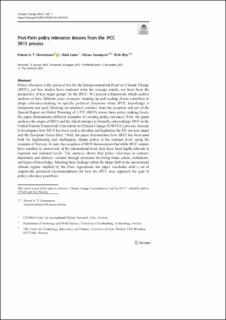Post-Paris policy relevance: lessons from the IPCC SR15 process
Journal article, Peer reviewed
Published version

Åpne
Permanent lenke
https://hdl.handle.net/11250/2987297Utgivelsesdato
2021Metadata
Vis full innførselSamlinger
- Journal articles [478]
Sammendrag
Policy relevance is the raison d’être for the Intergovernmental Panel on Climate Change (IPCC), yet few studies have analysed what the concept entails, not least from the perspective of key target groups for the IPCC. We present a framework which enables analysis of how different actor strategies (heating up and cooling down) contribute to shape relevance-making in specific political situations when IPCC knowledge is interpreted and used. Drawing on empirical evidence from the reception and use of the Special Report on Global Warming of 1.5°C (SR15) across three policy making levels, the paper demonstrates different examples of creating policy relevance. First, the paper analyses the origin of SR15 and the failed attempts to formally acknowledge SR15 in the United Nations Framework Convention on Climate Change (UNFCCC) process. Second, it investigates how SR15 has been used to develop and legitimize the EU net-zero target and the European Green Deal. Third, the paper demonstrates how SR15 has been used both for legitimizing and challenging climate policy at the national level, using the example of Norway. In sum, the reception of SR15 demonstrates that while IPCC outputs have resulted in controversy at the international level, they have been highly relevant at regional and national levels. The analysis shows that policy relevance is context-dependent and indirect—created through processes involving many actors, institutions, and types of knowledge. Situating these findings within the larger shift in the international climate regime implied by the Paris Agreement, the paper concludes with a set of empirically grounded recommendations for how the IPCC may approach the goal of policy relevance post-Paris.
